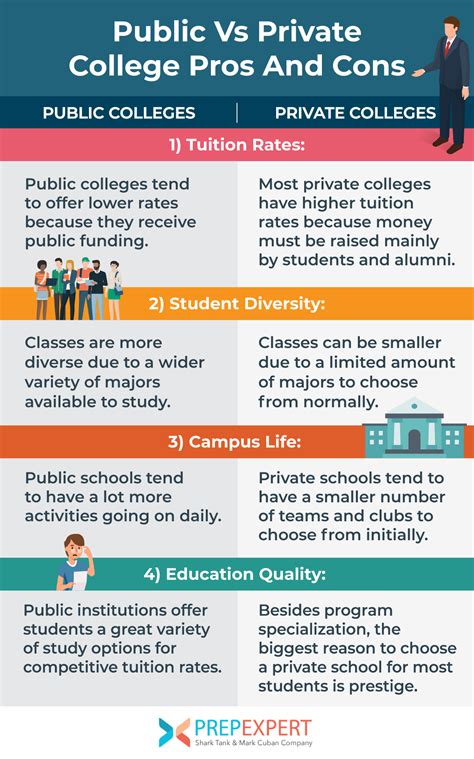Choosing between a private and public college is a significant decision that can impact your future. Both offer unique advantages and disadvantages, so it’s crucial to carefully consider your needs and financial situation before making a final choice.

Private Colleges: Advantages and Costs
Advantages:
- Smaller class sizes: Private colleges typically have smaller class sizes, allowing for more personalized attention from instructors.
- High academic standards: Private colleges often have high academic standards and competitive admissions processes, attracting top students.
- Prestige and networking: Private colleges often have a strong reputation and alumni network, which can provide valuable career opportunities.
- Specialized programs: Private colleges often offer unique and specialized programs not found at public universities.
Costs:
- Tuition and fees: Private college tuition and fees are significantly higher than public college tuition, with costs ranging from $25,000 to $50,000 per year.
- Room and board: On-campus housing and meals can add several thousand dollars to your yearly expenses.
- Other expenses: Additional expenses include books, supplies, transportation, and personal expenses.
Public Colleges: Advantages and Costs
Advantages:
- Lower tuition and fees: Public college tuition and fees are considerably lower than private college tuition, with average costs ranging from $10,000 to $20,000 per year in-state.
- Larger class sizes: Public colleges typically have larger class sizes, providing opportunities for more social interaction and collaboration.
- State funding: Public colleges receive state funding, which helps to offset tuition and fees.
- Wide range of programs: Public colleges offer a wide variety of programs, including undergraduate, graduate, and professional degrees.
Costs:
- Out-of-state tuition: Out-of-state students attending public colleges pay significantly higher tuition and fees than in-state residents.
- Possible waitlists: Public colleges may have waitlists for popular programs or majors.
- Competition: Admission to popular programs or majors at public colleges can be competitive.
Choosing Between Private and Public Colleges
The decision between a private and public college depends on your individual needs and financial situation. Consider the following factors:
- Your financial situation: If cost is a major concern, public college may be a better option.
- Your academic goals: If you value smaller class sizes and personalized instruction, private college may be a better choice.
- Your career aspirations: If you are interested in a field where networking and prestige play a role, private college may provide an advantage.
- Your preferences: Consider your personal preferences for the size, location, and atmosphere of a college.
Notable Statistics
- According to a study by the College Board, the average cost of tuition and fees at a private college in 2021-2022 was $38,070, while the average cost at a public college was $10,740 for in-state students.
- The National Center for Education Statistics (NCES) reported that the graduation rate for full-time, first-time students at private colleges was 66% within six years, compared to 61% at public colleges.
- The Pew Research Center found that the median annual income of adults with a bachelor’s degree from a private college was $68,000, while the median for adults with a bachelor’s degree from a public college was $60,000.
Effective Strategies
When choosing between private and public colleges, consider the following strategies:
- Visit both types of colleges to get a firsthand experience.
- Research the programs and majors offered at each college.
- Talk to current students and alumni from both types of colleges.
- Create a budget that includes all costs, including tuition, fees, housing, and personal expenses.
- Explore financial aid opportunities, such as scholarships, grants, and loans.
Frequently Asked Questions
FAQs:
-
Do private colleges offer better education than public colleges?
Private colleges may offer smaller class sizes and more personalized instruction, but the quality of education at public colleges is comparable in many cases. -
Is a degree from a private college more valuable than a degree from a public college?
In general, no. Employers value degrees from both private and public colleges based on the student’s academic performance and the reputation of the program. -
Can I get a good financial aid package at a private college?
Yes, many private colleges offer generous financial aid packages to students who qualify based on financial need. -
Is it worth the extra cost to attend a private college?
The value of a private college education depends on your individual needs and circumstances. If you are seeking a smaller campus, personalized instruction, or a strong alumni network, private college may be a worthwhile investment. -
How can I reduce the cost of college?
Explore financial aid opportunities, such as scholarships, grants, and loans. You can also consider attending community college for the first two years before transferring to a four-year institution. -
What are some of the best private colleges in the US?
Some of the top-ranked private colleges in the US include Harvard University, Yale University, Stanford University, and Massachusetts Institute of Technology (MIT). -
What are some of the best public colleges in the US?
Some of the top-ranked public colleges in the US include the University of California, Berkeley, the University of Michigan, and the University of Virginia. -
Is it possible to transfer from a public college to a private college?
Yes, it is possible to transfer from a public college to a private college. However, the transfer process can be competitive, and it is important to research the transfer policies of the colleges you are interested in.
By carefully weighing the costs and benefits of private and public colleges, you can make an informed decision that will set you on the path to success. Remember to consider your individual needs, financial situation, and career aspirations when making your final choice.
